Although Taiwan was officially founded on January 1, 1912, the events on October 10, 1911 are considered to be the spark that brought down the Manchu dynasty and led to the establishment of the ROC. October 10 commemorates the Wuchang Uprising; the Chinese people were fed up with the Manchu court. When people in the Szechuan Province found out that their railway company–built by the Chinese, for the Chinese, with hard-earned Chinese money–had been sold to a foreign interests, they rioted. The government tried to suppress the rioters and restore order. However, an accidental bomb explosion on October 10 precipitated the revolt. Troops mutinied, and within a few days, 15 provinces had declared their independence from the ruling Manchus, causing their downfall. Traditionally, displays of nationalism are everywhere. Flags are hung. Parades put honor guards, dignitaries, celebrities and traditional dance and music on display. Spectacular fireworks light up the sky over the Tamsui River in Taipei. On 10-10-2000, I went with my host mother to Chiang Kai-Shek Memorial Hall to watch the performances. They also had a huge market set up with all manner of traditional Taiwanese crafts and foods. Aunt Tracy bought me a gorgeous silk fan, and I’m STILL trying to figure out how to hang it on the wall without damaging it.
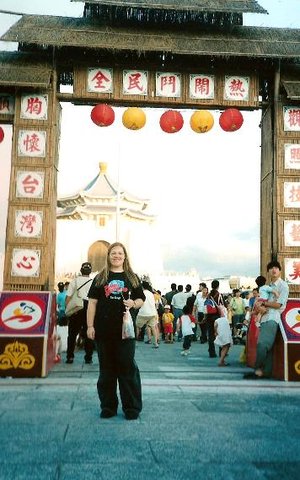
The ‘Waist-Drum Formation’ is also known as ‘Waist-Drum Planting Songs’, which originated from a dance of the inhabitants of the northern Shensi Province. It was intended to celebrate the yearly harvest and Chinese New Year. Afterwards, it became a rain dance due to the frequent droughts in the Huang-Tu plateau. ‘Jump-Drum Formation’ is a dance originating from soldiers and people celebrating victory after a war along the coastal provinces of China. Both dances are accompanied by percussion instruments (gongs and drums) in order to create an atmosphere of excitement.
In the past, processions have been in integral part of temple festivals and celebrations of Taiwan’s mainly agricultural society. With the advance of industry in Taiwan, the processions have become an important way to remember their cultural heritage. The Banchia Chao-Ho Association performed “Heavenly Generals and Northern-Style Music” which included six large effigy puppets: the four generals Hsiao, Chang, Liu, and Lian, along with ‘good eyesight’ and ‘good hearing’. The puppets led processions in an act called “Asking for General-Gods”. In addition to the procession, acrobatics and music are performed to help welcome the gods. These acrobatics include Chung-Chow stilts; said stilts originated in the Yellow Basin, where soldiers tied wooden sticks to their legs in order to walk through the marshes. According to legend, the Generals are in the service of the Gods, and their official duty is to expel ghosts and devils during the Gods’ inspection trip.
The Taoyuan, Hsinchu and Miaoli counties are the main areas inhabited by Taiwan’s Hakka communities. A majority of Hakka communities spend their time growing tea trees in the mountains. During the (arguably boring) process of picking tea leaves, they created folk songs sung by two singers who respond to each other. In the song, they express their feelings regarding all matters in life (with the exception of perhaps their feelings about red staplers and gay marriage.)
The harvest ceremony is the most important celebration of the Ami tribe. During the slack season from July to August, Ami people hold a grand celebration to express their gratitude to the earth and their ancestors for the plentiful harvest of grain, rice, and bamboo shoots. Note the traditional costume, including the traditional electronic watch that has been passed down for generations by the ancestors.
Lanterns and Colored Hangings  In traditional Chinese society, decorations of lanterns and colored hangings have been an inherent part of weddings and other celebrations. Red lanterns and red silk hangings symbolically create a joyful atmosphere. This dance was performed by the Lukang Art Troupe to symbolize the importance of said lanterns.
In traditional Chinese society, decorations of lanterns and colored hangings have been an inherent part of weddings and other celebrations. Red lanterns and red silk hangings symbolically create a joyful atmosphere. This dance was performed by the Lukang Art Troupe to symbolize the importance of said lanterns.
A Meeting of Lions from the North and South  The lion dance tradition of the north and south of China are divided by the Yang-tze River. Magnificent mountains and hills spread out south of the river, and the southern lions are therefore magnificently decorated. The cold weather to the north of the river causes the northern lions to grow long manes, mostly vibrant reds and yellows. In “A Meeting of Lions from the North and South”, two groups of lion dancers demonstrate their virtuosity individually and then play and frolic with one another. The acrobatics performed while in these giant costumes, by what looked like mostly little kids were AMAZING.
The lion dance tradition of the north and south of China are divided by the Yang-tze River. Magnificent mountains and hills spread out south of the river, and the southern lions are therefore magnificently decorated. The cold weather to the north of the river causes the northern lions to grow long manes, mostly vibrant reds and yellows. In “A Meeting of Lions from the North and South”, two groups of lion dancers demonstrate their virtuosity individually and then play and frolic with one another. The acrobatics performed while in these giant costumes, by what looked like mostly little kids were AMAZING.
Harmony 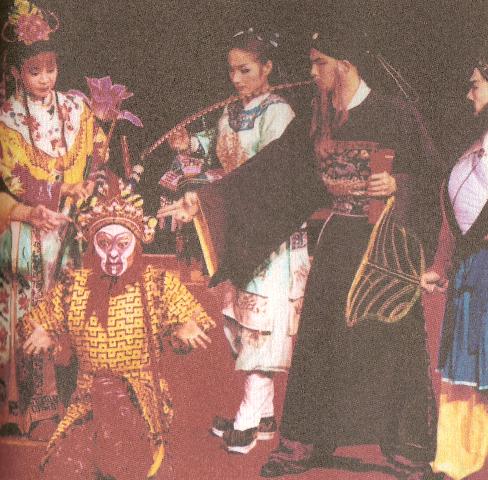 The “Eight Immortals” Taiwanese opera and the “Handsome Monkey King Sun Wu-kong” Peking opera were combined into one performance for this celebration. The story premise is that the Immortals and the Monkey King are engaged in an argument on their way to Formosa to attend the Jade Emperor’s birthday celebration. The Jade Emperor sends his most revered grandmother and the Old Immortal of the South Pole to settle the dispute, turning the two sides from foe to friend. Awwww. I’d like an Old Immortal from the South Pole to accompany me and settle my road rage disputes. After the performances at Chiang Kai-Shek Memorial Hall were over, Aunt Tracy and I went back to her apartment, where we met up with Dave and watched the incredible fireworks show from their roof. I can only imagine what the celebration will be like when Taiwan is truly free.
The “Eight Immortals” Taiwanese opera and the “Handsome Monkey King Sun Wu-kong” Peking opera were combined into one performance for this celebration. The story premise is that the Immortals and the Monkey King are engaged in an argument on their way to Formosa to attend the Jade Emperor’s birthday celebration. The Jade Emperor sends his most revered grandmother and the Old Immortal of the South Pole to settle the dispute, turning the two sides from foe to friend. Awwww. I’d like an Old Immortal from the South Pole to accompany me and settle my road rage disputes. After the performances at Chiang Kai-Shek Memorial Hall were over, Aunt Tracy and I went back to her apartment, where we met up with Dave and watched the incredible fireworks show from their roof. I can only imagine what the celebration will be like when Taiwan is truly free.


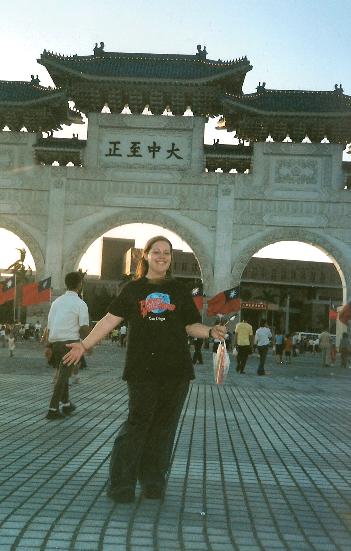
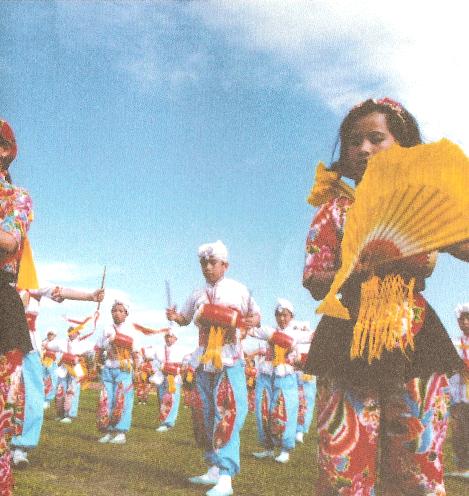
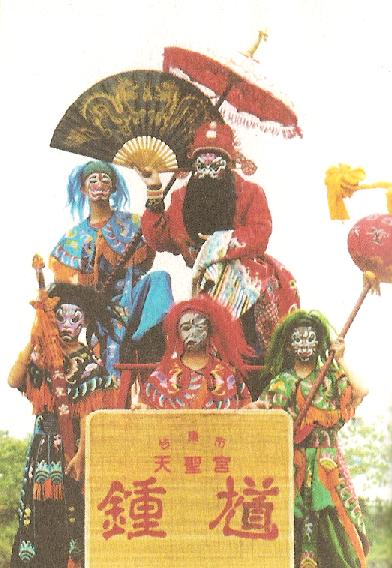
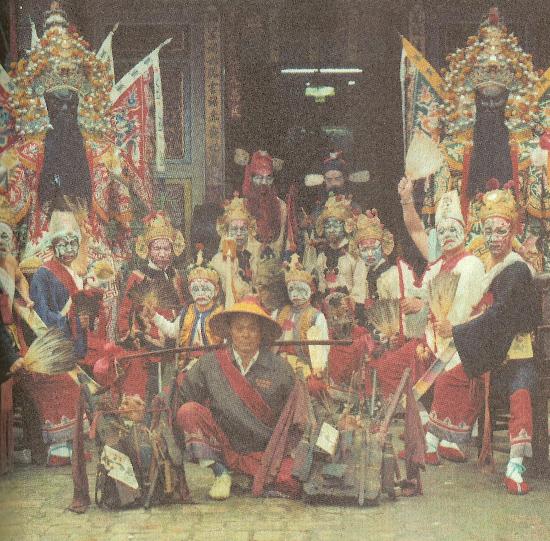
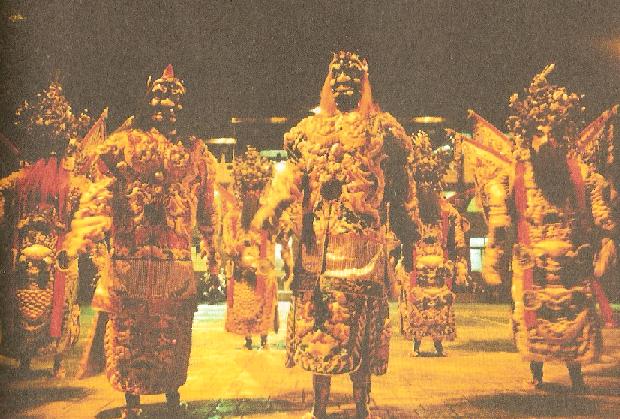
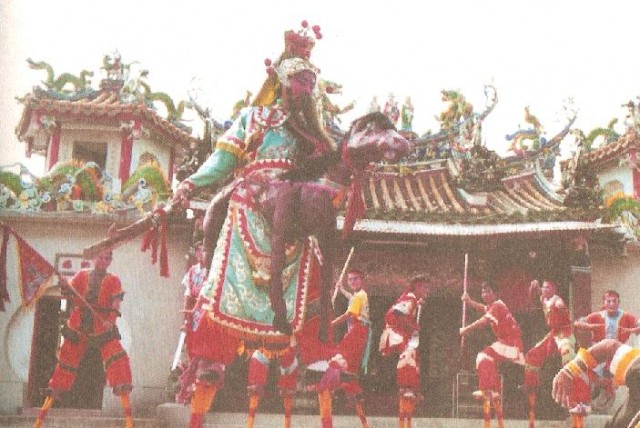
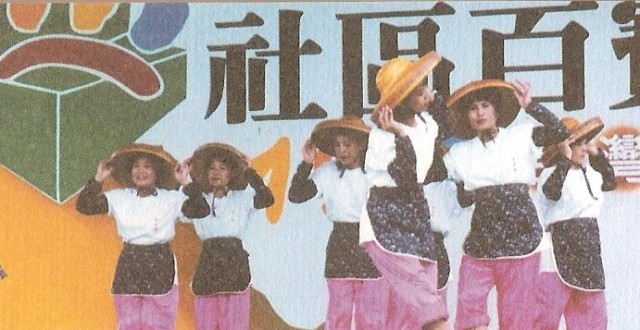
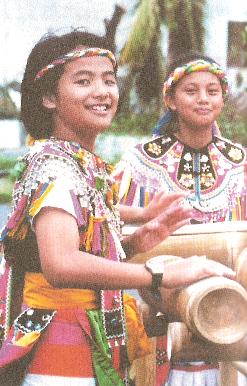
That kid has got to be the cutest lion dancer ever.
Also, most spelling errors in a Melissa post ever. Either you’re losing your touch or I’m an overly perceptive perfectionist asshole.
The DayQuil must be fucking with me.
I got hit pretty hard with teh sickness this week also. I took yesterday off of work to sleep the day away and I feel a whole helluva lot better now. If what you’ve got is anything like what I had, getting rest is the best thing you could do.
I think the massive intake of cold-eze + herbal tea is helping kill this thing fairly quickly. Already my head feels less stuffed up. Seems like a lot of people I know are sick; I wonder if it’s the change of seasons that’s screwing with all of us. I know I tend to get sick when the temperature fluctuates wildly.
I wanted to see Korn at the Tacoma Dome this Sunday but I’m not banking on the fact that I won’t still feel like shit then.